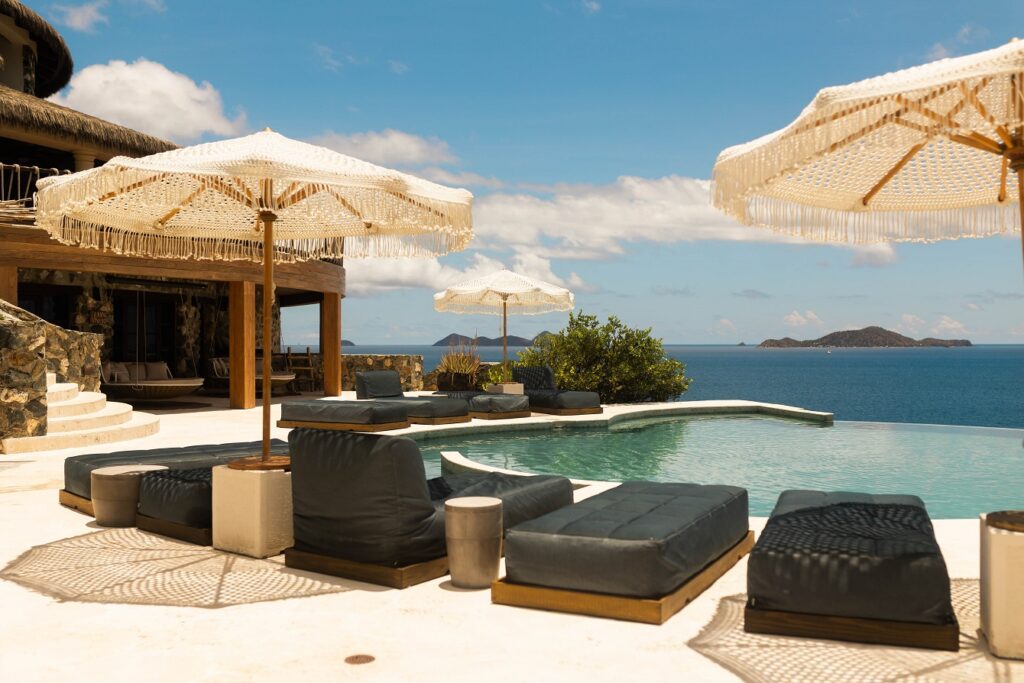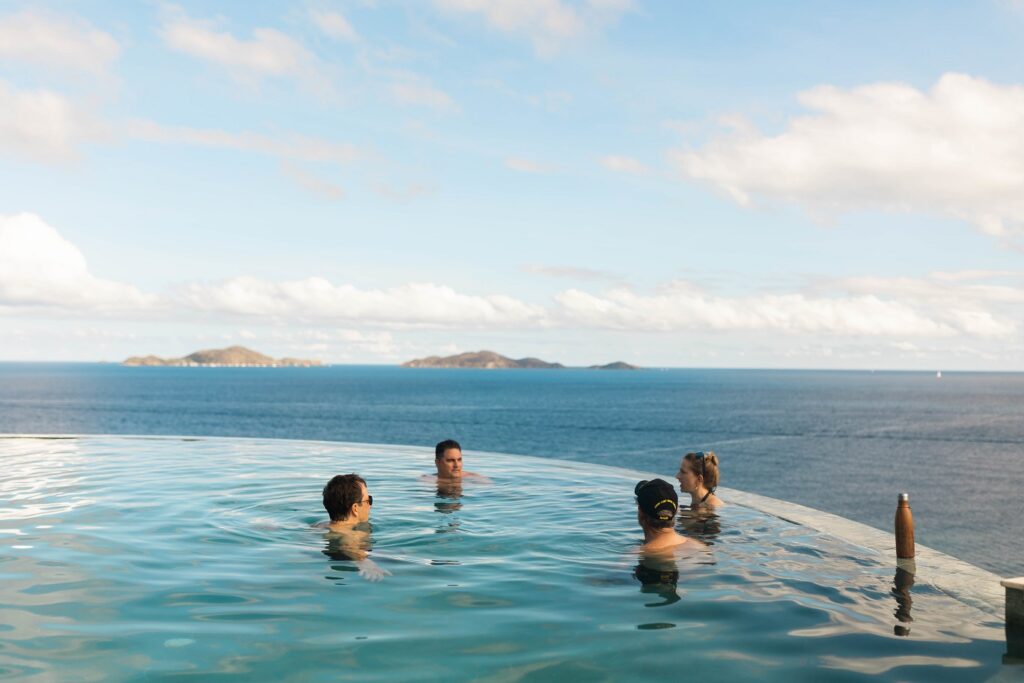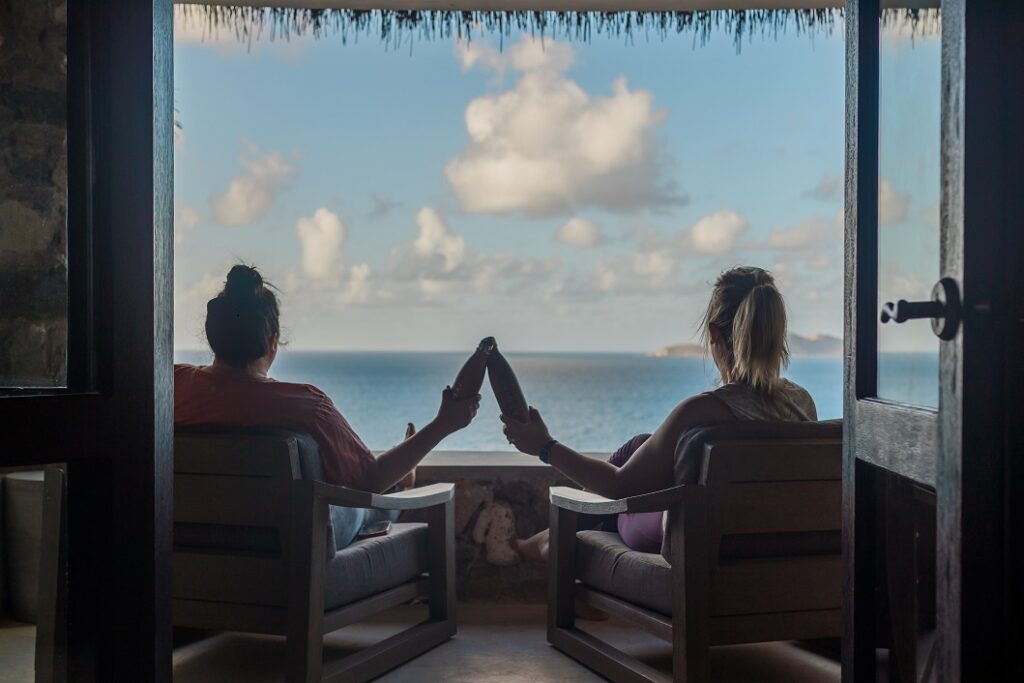The best time to visit the British Virgin Islands depends on what you’re hoping to get out of your stay. For a destination wedding or scuba diving vacation, you’ll probably want to come when it’s sunny and dry and the turquoise waters are at their clearest.
However, if you’re keen to see the turtle nesting season, attend one of our summits, or join in with the BVI Spring Regatta and Sailing Festival, the timing of your trip will be determined by the dates of the event itself.

Peak Season in BVI
The most popular months for visiting the British Virgin Islands are December through April, with a peak in March when families come to enjoy the white sand beaches during spring break.
There are several reasons for this:
- The weather is sunny and rainfall is minimal.
- Temperatures during the day are milder.
- It’s not as humid in the winter months as it is in the summer.
- The sailing season is in full swing.
- People who live in North America and Europe come to the Caribbean to escape the cold.
If you want to come in the dry season but don’t want to deal with large crowds, the best time to visit BVI is in January or February (after Christmas and New Year but before spring break).
Shoulder Seasons
April-May (late spring) and November (late fall) are great times for visiting the British Virgin Islands because the weather is warmer than it is in the winter months. While the average rainfall is higher, the rain usually comes in bursts and there is still plenty of time to enjoy and explore the outdoors.
The shoulder seasons are often ideal for homeschool families and people who are traveling without children as you can get better deals on accommodation and flights. These are also great months for swimming because the water is warmer but still clear.
Early Summer
June 1 marks the start of the Caribbean hurricane season, which runs through November 30. Fortunately, the chances of a hurricane in the Eastern Caribbean are still low in June, July, and August.
In the early summer, the weather is wet and humid and the waters are usually murkier than usual, so these are not great months for scuba diving. However, if you’re coming to relax at a luxury wellness retreat, swim, see a festival, or join one of our Elevate Summits, early summer is ideal.

Low Season in the British Virgin Islands
September and October are the wettest months in the BVI. However, that shouldn’t deter you from traveling if this time of year best fits your schedule. If you do visit in mid-summer, consider purchasing travel insurance.
BVI Weather by Month
In winter (the dry season), temperatures average in the 80s (F) during the day and in the 70s at night. In the summer (the wet season), the days can get as hot as 90°F with averages in the 80s at night, making it perfect for watersports activities and dips in the cool Caribbean ocean. There are 11 hours of daylight in winter and 13 hours of daylight in summer with cloud cover from April through November.

Please note: The data cited in this section is taken from WeatherSpark.com. You can find more detailed weather information and short-term weather forecasts on the TGFTP website and the Marine Association of the BVI website.
January
Average high: 83°F
Average low: 74°F
Water temperature: 80°F
British Virgin Islands weather in January is beautiful, with clear skies and minimal rainfall.
February
Average high: 83°F
Average low: 74°F
Water temperature: 79°F
February is the coldest month in the BVI, although with an average high temperature of 83°F, it will seem warm to northerners escaping the ice and snow.
March
Average high: 84°F
Average low: 75°F
Water temperature: 80°F
In March, the skies are clear and temperatures are mild, making this a popular month for family vacations.
April
Average high: 85°F
Average low: 77°F
Water temperature: 80°F
April marks the start of the cloudier months (through November). The islands average between two and three inches of rain in April, June, and July.
May
Average high: 86°F
Average low: 78°F
Water temperature: 81°F
May is the start of the rainy season (through mid-December) and the weather starts to feel a bit hotter from May until the end of October.
June
Average high: 87°F
Average low: 79°F
Water temperature: 82°F
June 1 is the start of the British Virgin Islands hurricane season, although hurricanes are more likely to hit Florida and the Gulf of Mexico in June.
July
Average high: 88°F
Average low: 80°F
Water temperature: 83°F
July is the windiest month in the BVI and the water is warm. Expect higher than average rainfall, overcast skies, and a moderate chance of tropical storms.
August
Average high: 89°F
Average low: 80°F
Water temperature: 83°F
August and September are the hottest months in the BVI, with average temperatures exceeding 87°F. There is a chance of hurricanes in August but there’s generally less rain than there is in November.
September
Average high: 88°F
Average low: 79°F
Water temperature: 84°F
September is warm and humid, which can be romantic if you love overcast skies as much as we do. The water is warmest in September, making it an ideal month for evening dips in the sea.
October
Average high: 87°F
Average low: 78°F
Water temperature: 83°F
October is similar to September, except that temperatures are around one degree cooler. There is very little wind in October, making it one of our favorite months for surfing and paddleboarding.
November
Average high: 85°F
Average low: 76°F
Water temperature: 83°F
In November, expect warm weather and a low chance of hurricanes. BVI is the perfect Thanksgiving getaway.
December
Average high: 84°F
Average low: 75°F
Water temperature: 81°F
BVI weather in December is calm, the skies are clear, and there’s less rain. Mid-December marks the start of the peak season for tourists.
Annual Events in BVI
The British Virgin Islands hosts several annual events that can be a lot of fun to join in. If you’d like to party with the locals or volunteer during turtle nesting season, it makes sense to plan your visit around those dates.
- End of December-January – New Year’s Eve and New Year’s celebrations
- March – BVI Spring Regatta and Sailing Festival
- March – HiHo Windsurfing Competition
- March/April – Spanish Town Fisherman’s Jamboree and the annual Easter festival
- March-July – Turtle nesting season
- May (Memorial weekend) – BVI Music Festival
- May/June – Wreck Week
- June – Fisherman’s Day
- Late July-early August – The islands celebrate the BVI Emancipation Festival, which runs for two weeks
- August-October – Migratory shorebird season
- December – Christmas on Main Street
Anytime Is a Great Time to Visit the BVI!
While summer can get hot and humid, there’s plenty to see and do no matter when you visit the British Virgin Islands. And depending on your schedule and the events you want to see, the dates might be chosen for you. Check out the Elevate Summits that run year-round at The Aerial, BVI here.
The most important thing to remember when planning your dates is that different seasons offer different opportunities. As long as you choose a month with the weather conditions and activities that best suit your goals, you’re sure to have a wonderful time.